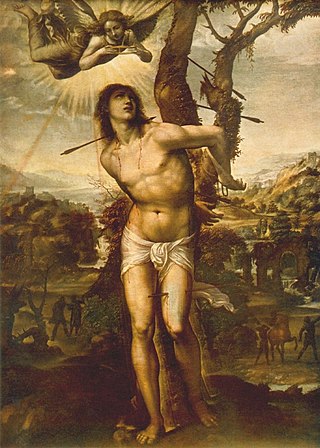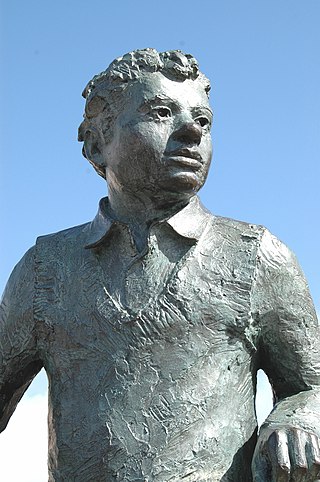Related Research Articles

Dominic, Dominik or Dominick is a male given name common among Roman Catholics and other Latin-Romans. Originally from the late Roman-Italic name "Dominicus", its translation means "Lordly", "Belonging to God" or "of the Master".
Mike is a masculine given name. It is also encountered as a short form of Michael. Notable people with the name include:

Jeff is a masculine name, often a short form (hypocorism) of the English given name Jefferson or Jeffrey, which comes from a medieval variant of Geoffrey.
Bruno is a given name and surname of Old Germanic origin. In the Latin languages, it comes from Brunus, a Latinized form of a Germanic name composed of the root brun-, which can mean burnished and also moreno, also present in the words braun and brown.
Carl is a North Germanic male name meaning "free man". The name originates in Old West Norse.

Darren is a masculine given name of uncertain etymological origins. Some theories state that it originated from an Anglicisation of the Irish first name Darragh or Dáire, meaning "Oak Tree". According to other sources, it is thought to come from the Gaelic surname meaning ‘great’, but is also linked to a Welsh mountain named Moel Darren. It is also believed to be a variant of Darrell, which originated from the French surname D'Airelle, meaning "of Airelle". The common spelling of Darren is found in the Welsh language, meaning "edge": Black Darren and Red Darren are found on the eastern side of the Hatterrall Ridge, west of Long Town. In New Zealand, the Darran Mountains exist as a spur of the Southern Alps in the south of the country.

Sebastian is both a given name and a surname. It comes from the Greek name Sebastianos (Σεβαστιανός) meaning "from Sebastia" (Σεβάστεια), which was the name of the city now known as Sivas, located in the central portion of what is now Turkey; in Western Europe the name comes through the Latinized intermediary Sebastianus. It was a name of ancient Greek origin, given to children not born free and found on the streets of Sebastia. The name of the city is derived from the Greek word σεβαστός (sebastos), "venerable", which comes from σέβας (sebas), "awe, reverence, dread", in turn from the verb σέβομαι (sebomai), "feel awe, scruple, be ashamed". Sebastos was the Greek calque of the title Augustus, which was used for Roman emperors. Sebastian became a widely used name because it was the name of Saint Sebastian, a third-century Christian martyr.
Nico is a unisex given name. It is a short form of Nicholas, Nicolas, Nicola, Nicole, Dominic and others. In Italian it may also be short for Domenico, Nicolò and for Nicodemo. Notable people with the name include:
Marcel is an Occitan form of the Ancient Roman origin male given name Marcellus, which in Latin means "Belonging to Mars". The feminine counterpart of the name is Marcelle. It is used predominantly in France, Monaco, Switzerland, Spain, Italy, Belgium, Germany, Hungary, Canada and partially in Poland and Romania. It may refer to:

Marco is an Italian masculine given name of Etruscan and Latin origin, derived from Marcus. It derives from the Roman god Mars.

Marcus is a masculine given name of Ancient Roman pre-Christian origin derived either from Etruscan Marce of unknown meaning or referring to the god Mars. Mars was identified as the Roman god of War.

Dylan is a given name and surname of Welsh origin. It means "son of the sea” or "born from the ocean". Dylan ail Don was a character in Welsh mythology, but the popularity of Dylan as a given name in modern times arises from the poet Dylan Thomas. In Wales, it was the most popular Welsh name given to boys in 2010.
The given name Logan is derived from the Scottish surname Logan, which is in turn derived from a place name. The likely origin of this surname is a place located near Auchinleck, in Ayrshire. The place name is derived from the Scottish Gaelic lagan, which is a diminutive of lag, which in turn means "hollow". The given name is borne by males and females.
Leo is a given name in several languages. In European languages, it is usually a masculine given name and it comes from the Latin word leo, which in turns comes from the Greek word λέων meaning "lion". It can also be used as a short form of other names that begin with Leo-, such as Leonard, Leonardo, or Leopold. In Japanese, Leo or Reo (怜央) is usually a masculine given name.
Alex is a given name. It can refer to a shortened version of Alexander, Alexandra, Alexis.
Felix is a given name that stems from Latin felix and means "happy" or "lucky". Its other form is Felicity.
Kyle is an English-language given name, derived from the Scottish Gaelic surname Kyle, which is itself from a region in Ayrshire.
Max is a given name. In the masculine, it is often short for Maximilian, Maxim, Maxwell, Maxfield, or Maximus in English; Maximos in Greek; or Maxime or Maxence in French. In the feminine it usually stands for Maxine.
Lucas is a Latin masculine given name, from which the English name Luke comes.
References
- ↑ Evans, Cleveland Kent (22 May 2023). "Evans: A Look at the Top Baby Names of 2022". omaha.com. Omaha World Herald. Retrieved 11 December 2023.